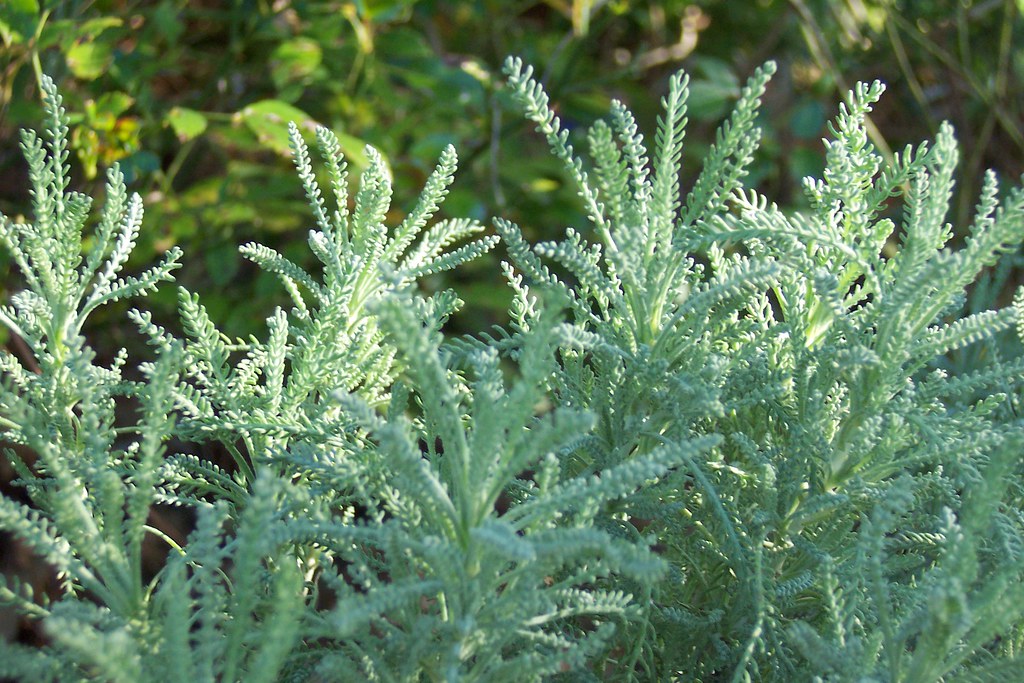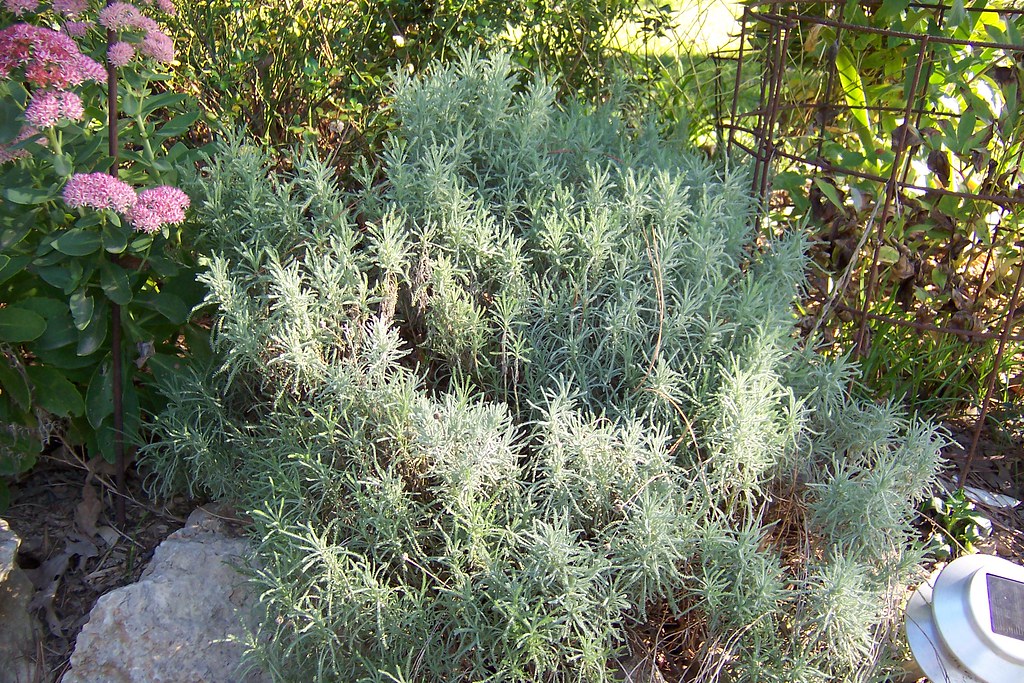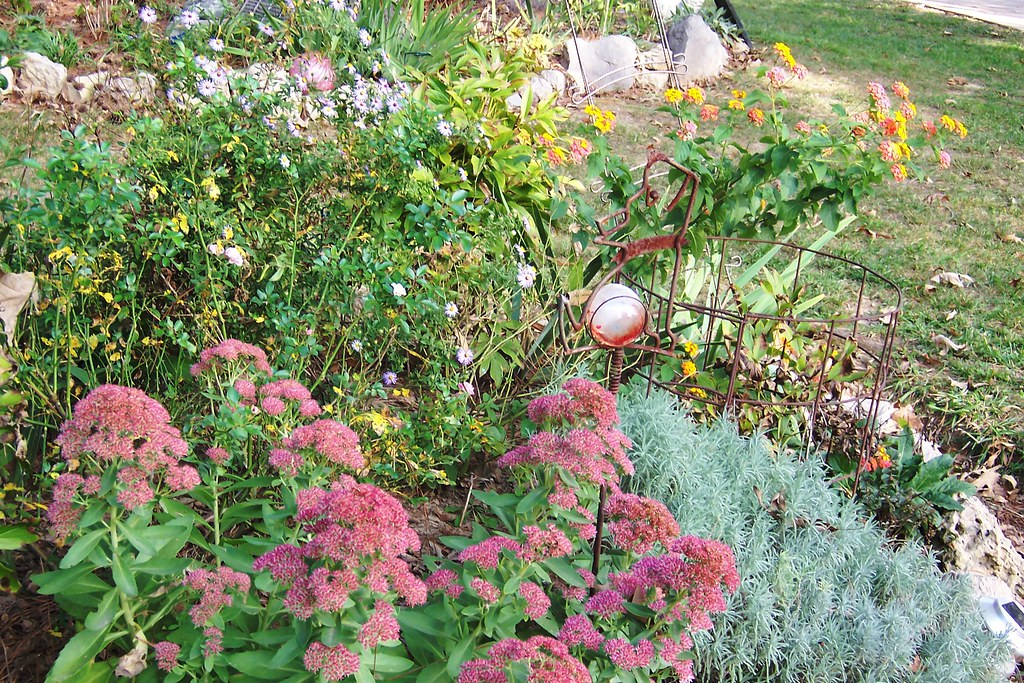
It has been quite a while since I have done a Plant of the Month post so I thought I'd let you know about a fantastic plant growing in my garden that tops even the Plant of the Month. This plant commonly called Lavender Cotton or Santolina (Santolina chamaecyparissus) is a contender for Plant of the Year in my gardening book (that is the book I am keeping about my gardens:).
Lavender cotton is a gray foliaged plant that is soft to touch and has a very fine frilly fine textured appearance. It is slow to get started in the garden but once it settles in and gets going no other plant can match it for endurance and its year round good looks. Santolina needs a well drained area in full sun (but will grow in part sun as evidenced in my garden) with average soil. I never prune my santolina nor do I fertilize it. Be sure to site santolina near the front of your border so it can be enjoyed up close and is not overshadowed by other plants. Being a gray leaved plant santolina does not need a lot of water-I've never watered mine. Plant santolina in any hot and dry area and it will slowly fill in that area making a great evergreen ground cover.
A few good companion plants for santolina can be sedum (as evidenced in the second and third pictures of this post), irises, baptisia, roses, or salvia. Santolina is actually a plant that can go with almost all other plants except other gray leaved plants that are frilly (like catmint and artemesia). I also think santolina is a better groundcover under roses than the usual lavender but remember santolina does not need a lot of water. Lavender is not always a long lived plant for our area so I am not a big fan of lavender. Be sure to allow for at least a four square foot area for your santolina to grow and spread.


When santolina blooms it blooms a cute button like yellow flower. The yellow bloom is similar to the bloom of tansy but you should not consider the bloom of santolina when deciding whether or not to plant santolina. Santolina is what I consider a foliage plant that truly does not need any blooms to shine....
in the garden....
Words and Photos Property of In the Garden Blog Team, In the Garden
Thank you for this introduction. These looks and sounds like a great addition and what wonderful color foliage.
ReplyDeleteIt's a good one! I received one at the plant swap last time I went. I need to put it in a better location as the nearby catnip completely shaded it out over the summer.
ReplyDeleteNice looking Lavender. My lavender looks a bit worn in the summer but makes a great comeback every spring. The bees love it. Raining in GA today, Yippee…
ReplyDeleteIt is a very pretty foliage plant.
ReplyDeleteGood Skeeter but the down side of it is that it is headed this way. Our ground is so spongy now from so much rain. I wish you could keep it. My wheelchair is tearing spots up in the lawn that have never been a probem before.
Tina, I have tried and tried to grow Santolina, but with no luck. I think maybe the clay soil is the problem. I like the look and the scent of this plant--so sure wish it would work. I am trying to add expanded shale to my beds..slowly..so maybe I can try it again one day.
ReplyDeleteLinda, I don't think it is the clay soil but I have noticed santolina is very slow to get started. If you plant it somewhere and it languishes then move it elsewhere or it will die. Key is good drainage (shale will help) and dry in winter and some sun.
ReplyDeleteThat is a lovely looking plant. I've never heard of it, so will see if it will survive here. I do have the sedum that I could pair it with.
ReplyDeleteJean we had tornado warning here. Rained yesterday. I think we've had enough for a spell.
Wow! Plant of the year! I'll have to check this one out!
ReplyDeleteThanks for introducing me to this plant, Tina. I love the feathery foliage, and the silvery color is an added bonus. I could use more plants that don't need extra watering, especially after I just finished watering my poor hydrangeas:)
ReplyDeleteWhat a gorgeous plant...one I would love but it woud be pushing the zone envelope for me...although if I found the right spot I might get away with it...
ReplyDeleteThis is one of the first plants I knew the name of. My mom grew it in her garden and the aroma of the foliage stood out to me. Today, anytime I see it I have the run my fingers through it to get a whiff of that Listerine fragrance.
ReplyDeleteI haven't grown this but I really like it. It has the look of artemesia without (I'm assuming) its megalomaniac tendencies.
ReplyDeleteLovely, I wonder if I could grow it. I never have had any luck with lavender.
ReplyDeleteSkeeter and Carolyn, This plant is not lavender. It is completely different. Both of you should be able to grow it.
ReplyDeletewow Tina, that first photo really make that plant more beautiful and elegant. It is better than the photos shot on top, because as i look at the 2nd photo i seem to be looking at a profuse rosemary growth. That pinkish sedum is beautiful too!
ReplyDeleteSounds like a perfect candidate for my front area by the street. Super dry, full sun, and with it being a gray fuzzy---it should be derr resistant. thanks for the idea!
ReplyDeleteTina, I just stumbled onto your blog. what a great site you have!! i am your newest follower and I hope you will follow back!
ReplyDeleteIt's a pretty cool looking plant, the gray foliage looks great with that Sedum.
ReplyDelete